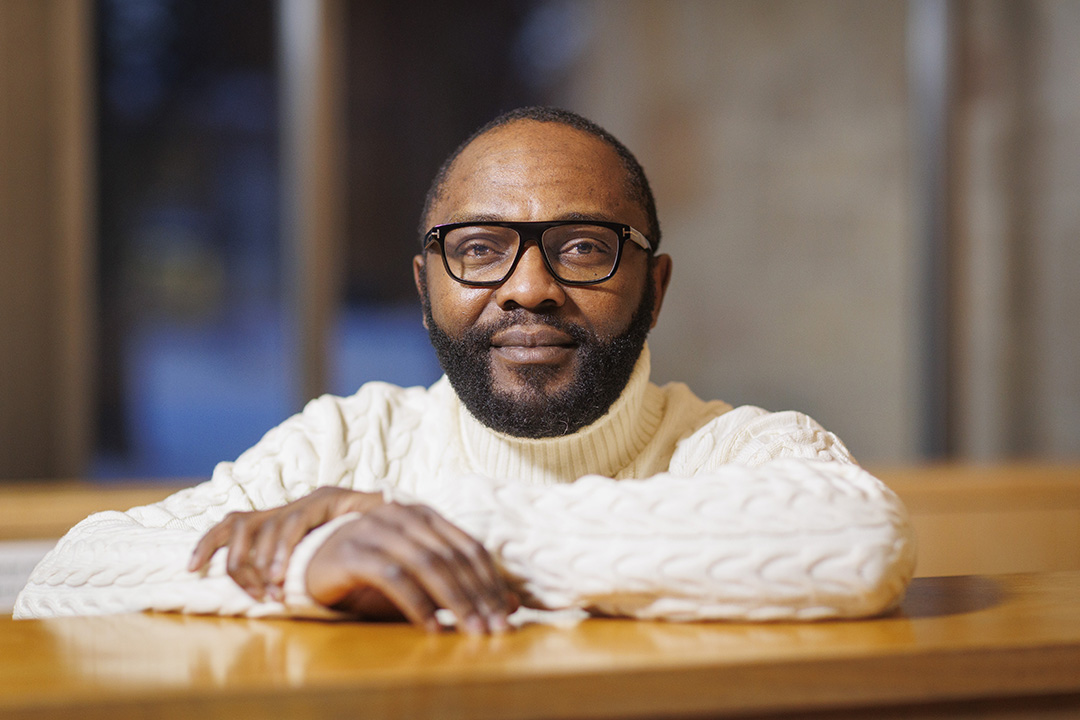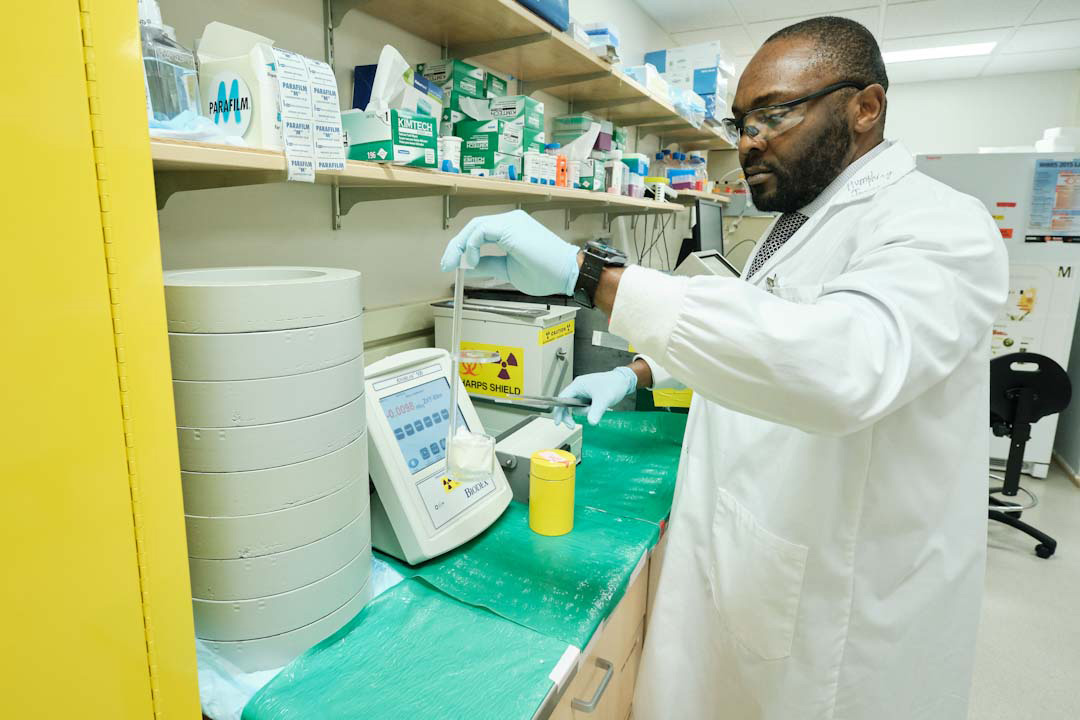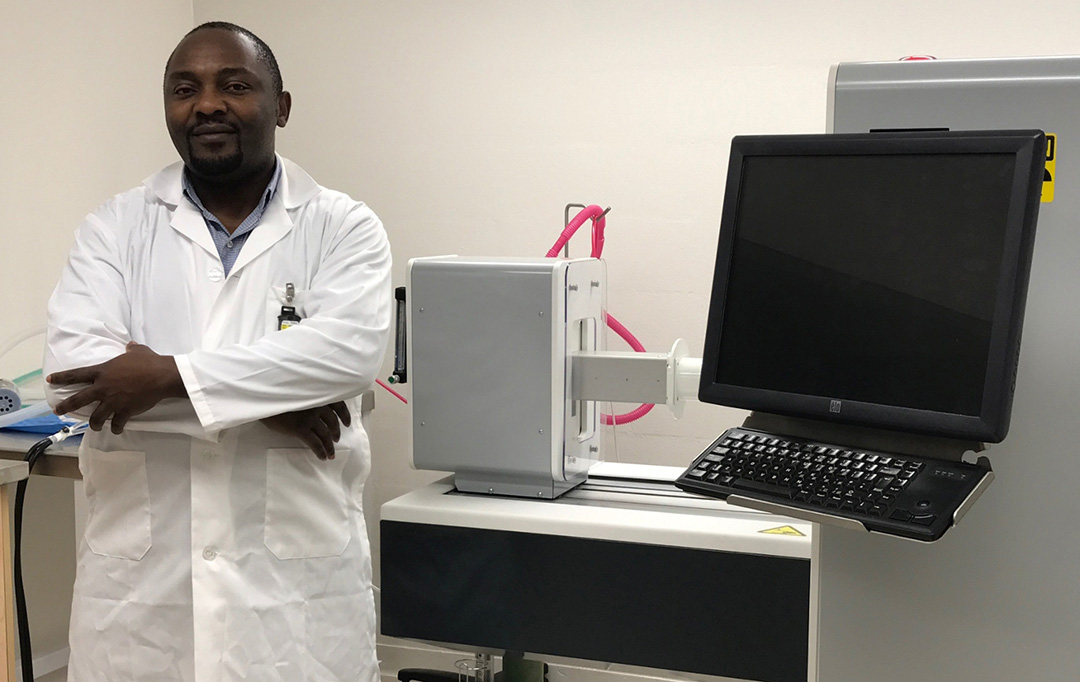
Black History Month: Fonge making a difference at USask
When it comes to cancer research, scientists like Dr. Humphrey Fonge (PhD) know they are always working against the clock for patients who often don’t have the benefit of time.
By James Shewaga“It is a huge race against time, and I get emails from patients and you really feel for these people and what they are going through,” said Fonge, an award-winning nuclear medicine researcher and associate professor of medical imaging in the College of Medicine at the University of Saskatchewan (USask). “People who you don’t know tell you about how much they count on your efforts, so for me it is a race to save even one life. I would retire a happy man, if one of these breakthroughs saved lives.”
Like most people, Fonge has had family and friends face cancer, and has dedicated his life to improving the diagnosis and treatment in an effort to increase the odds of patient survival.
“I don’t know anyone who doesn’t have a family member affected by cancer, because 45 per cent of Canadians are going to be diagnosed with one form of cancer or another in their lives, so I am very passionate about this research,” said Fonge, who has been a leader in research advancements since being recruited to come to USask 11 years ago. “My research focuses on two things that are complementary to each other. It’s about the ability to better diagnose different cancer types, so that is the diagnostic part. And the second part of it is the therapeutic part: the ability to better treat different cancer types.”
Fonge’s work has helped bring substantial research funding to USask over the past decade for everything from triple-negative breast cancer and prostate cancer to colorectal and neuroendocrine tumours. His latest million-dollar grant to develop new diagnostics and therapeutics for pancreatic and ovarian cancer – along with co-applicants Dr. Maruti Uppalapati (PhD) and Dr. John Gordon (PhD) – was part of a record-setting round of $7 million in grants for USask from the Canadian Institutes of Health Research (CIHR) last summer.
“I have received lot of CIHR grants, lots of SHRF (Saskatchewan Health Research Foundation) grants, Western Economic Diversification grants, and I think in the last 10 years it’s all totalled about 17 million dollars,” said Fonge, who received SHRF’s annual Santé Impact Award in 2020 for his cutting-edge research. “We just received new CIHR funding for pancreatic and ovarian cancer and I have many grants for different cancer types, including triple negative breast cancer. They are all very dangerous. So a big part of what I do is I identify a clinical problem – and there are many of them, unfortunately – and then I start working on solutions.”

Fonge’s focus is on improving imaging tools and techniques to better diagnose deadly cancers, while also creating cancer-fighting compounds and testing therapeutics, as his team strives to turn success in the lab in animal models into clinical human trials to improve cancer treatments.
“The clinical problem is, usually for most cancers, the standard of care for these cancers is sub-optimal,” said Fonge. “Patient management is critical for a lot of different cancer types and that is why mortality rate is so high. What I do is based on the concept that if I can see it, then I can attempt to treat it. In terms of how close we are to a breakthrough, a breakthrough for me would be when I am able to start testing the compounds in patients.”
For the past decade, Fonge has helped create the labs that he now works in and has helped trained dozens of graduate students and post-doctoral researchers, and is quick to credit the university for now featuring some of the country’s leading medical imaging tools on campus, from the cyclotron to the new microPET/SPECT/CT scanner.
“It’s been really hard work, but I really enjoy it,” said Fonge, who also serves as a radiopharmacist for the Saskatoon Health Region. “I have received support here and I am really grateful for everything that I have. I know the hands of every institution is tight, and I am just focusing on my research and helping to train students and post-docs in my lab. And from a research standpoint, the nice thing is just the amazing facilities we have here that have allowed me to do my work.”
Born and raised in Cameroon – where temperatures average more than 30 Celsius year-round, compared to the minus-30s often experienced in Saskatoon at this time of year – Fonge’s path to USask began more than 20 years ago when he earned a scholarship to attend graduate school at the prestigious KU Leuven institution in Belgium at the age of 24. After earning his master’s and PhD in radiopharmacy in Belgium, Fonge moved overseas for a post-doctoral fellowship at the University of Toronto, where he also made time to complete a Master of Business Administration in 2011.
“The MBA actually shaped the way I do science,” said Fonge. “I finished my MBA with an emphasis on innovation, so I learned during those years about being innovative and it gave me a completely different spin on science and that innovation has driven a lot of my approach to this day.”
Having never been to Saskatchewan before, Fonge was recruited to come to USask in 2013 by former department head Dr. Paul Babyn (MD), and has never looked back.
“I didn’t know what that opportunity would look like until the picture was presented to me about what I would be doing, and it was picture perfect,” said Fonge. “So I came here and I have no regrets.”
After moving from Cameroon to Belgium to Canada, Fonge quickly found himself feeling right at home in Saskatoon, after heading west from Toronto.
“This place has been way more accommodating and has felt way more at home for me than where I used to live,” he said. “That’s not to say that I don’t see some things around me, but in terms of discrimination, Saskatchewan is a better place for me, and it’s funny that even though it is not as cosmopolitan as cities like Toronto, people here are always nice and I didn’t always have that feeling when I lived in Toronto. And I think things have changed a lot over the last 10 years. I still remember back in 2011, having an interview with a company and the human resources officer from the company called me and said they couldn’t hire me because of my accent. But I have never felt that way here.”

Two years ago, Fonge helped co-found USask’s Black Faculty and Staff Caucus, to provide support, mentorship and fellowship for fellow members of the Black community on campus. As USask celebrates and highlights Black History Month, Fonge is proud of the support that he has received here, the colleagues who have become friends, and the opportunity give back and be the mentor he didn’t always have in his university years.
“Because I am a minority, I am so passionate about helping others,” said Fonge. “I think you get an incredibly different perspective when you have people of different backgrounds, different genders, different cultures, represented at the table. So I am so passionate about this caucus that we started because most people when they start a faculty position now, they have mentors and so on, but I had nothing when I started. So if I am able to offer any form of support to any faculty and staff, or students, I am very passionate about that.”
From implementing its Equity, Diversity and Inclusion Policy, to developing anti-racism training, to celebrating Black History Month, Fonge said the university has taken significant steps to be the most welcoming place it can be for all students, staff and faculty.
“I think that is something that more universities are trying to do, but I know the University of Saskatchewan is doing this genuinely,” said Fonge. There is just that feeling here that we are all welcome and we are all equal. And I was blown away by the speech by the president (Peter Stoicheff) recently and I feel that there are many people here who are genuinely supportive.
“(Celebrating Black History Month) started a couple of years ago, and I am so grateful that the university has done this and it is wonderful to have the opportunity to sit down with the deans and the president and talk to them about how we feel and what we would like to see. So, I think it is one of the most important events of the year.”
Article re-posted on .
View original article.
Together, we will undertake the research the world needs. We invite you to join by supporting critical research at USask.

